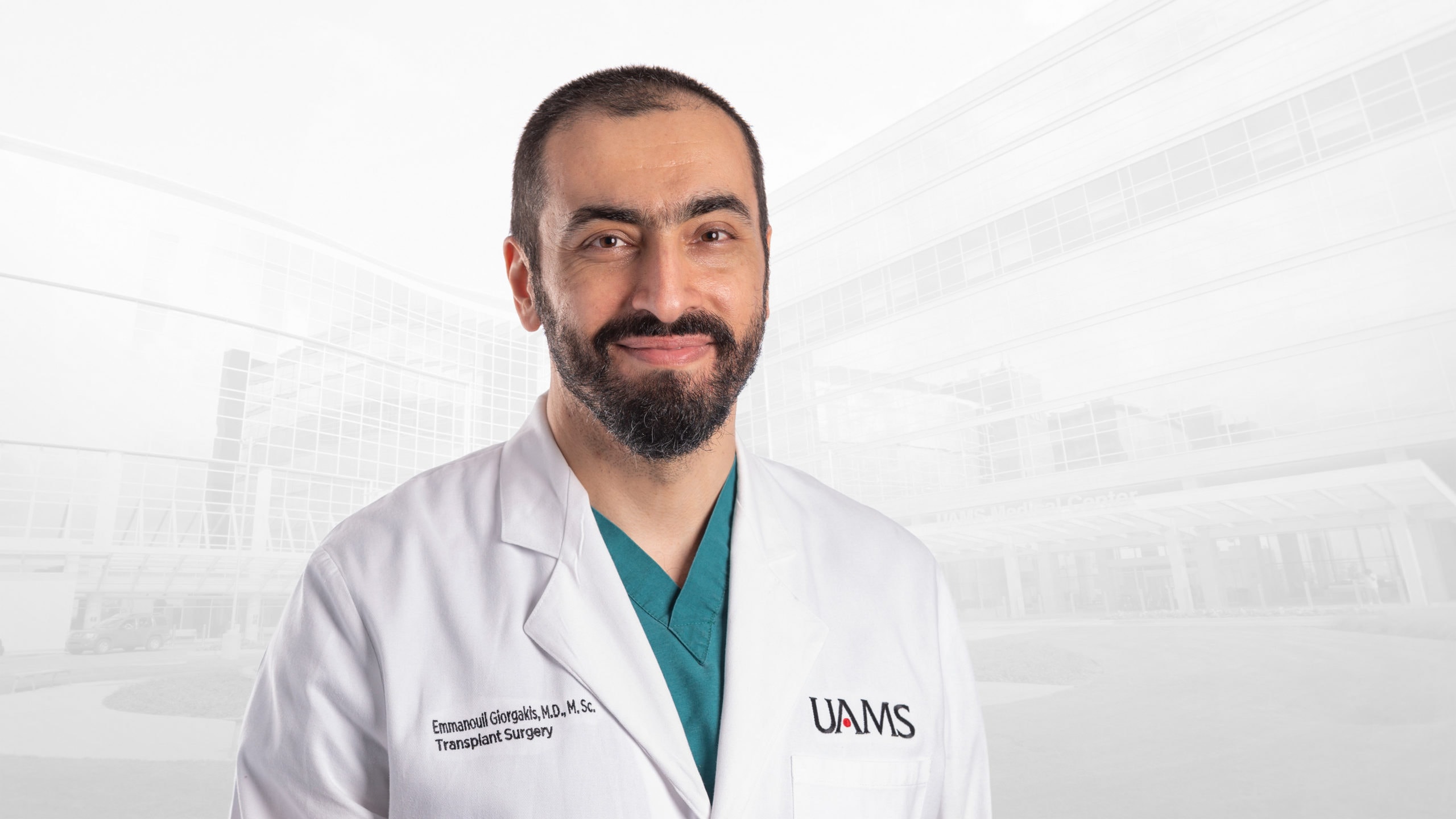View Larger Image

Emmanouil Giorgakis, M.D.
UAMS Performs State’s First HIV-to-HIV Kidney Transplant
| LITTLE ROCK — The University of Arkansas for Medical Sciences (UAMS) has performed the first transplant in Arkansas from an HIV-positive donor to an HIV-positive recipient.
The successful kidney transplant from a deceased person who had the human immunodeficiency virus was performed in May by Emmanouil Giorgakis, M.D., a transplant surgeon in the UAMS College of Medicine.
It was performed as part of a national clinical trial, led and sponsored by Johns Hopkins Hospital in Baltimore, which was made possible by the HIV Organ Policy Equity (HOPE) Act that Congress passed in 2013. The law permits transplant teams in the United States with an approved research protocol to transplant organs from compatible HIV-positive donors into eligible HIV-positive recipients enlisted for a transplant, who have consented to participate in the study.
HIV is a virus that, if left untreated, causes acquired immune deficiency syndrome (AIDS), a medical condition that leaves the body defenseless against opportunistic infections. However, improvements in antiretroviral treatments over the years have allowed people with HIV to live normal life spans.
UAMS is one of 27 transplant centers nationwide that are taking part in the HOPE in Action clinical trial of deceased HIV-positive donor kidney transplants to HIV-positive recipients. This multicenter pilot study evaluates the safety of HIV-positive deceased donor kidney transplants in HIV-positive recipients.
UAMS, which operates the only adult liver and kidney transplant program in Arkansas, is also one of the 17 US transplant centers participating in the HOPE in Action Trial of HIV-positive deceased donor liver transplants for HIV-positive recipients.
Stable HIV-positive adult liver or kidney transplant candidates are currently being offered enrollment in the clinical trial study at UAMS.
“There are over 120,000 patients on the waiting list for a kidney in the United States, and about 10,000 of those are HIV-positive patients,” Giorgakis said. “HIV-positive patients have a higher risk of kidney failure and carry a three-fold risk of death while on dialysis compared to their HIV-negative counterparts.”
“If we could use organs from HIV-positive donors, there would be an estimated 1,000 more available grafts each year,” Giorgakis said.
Although enacted in 2013, the HOPE Act didn’t become effective until November 2015, following the development and publication of research criteria for HIV-positive organ donations to HIV-positive recipients. The first deceased donor HOPE transplants in the United States took place in 2016.
So far, Giorgakis said, there have been 100 HIV-to-HIV kidney transplants performed nationwide through the clinical trial, including the May 3 transplant that immediately allowed Richard Poston, 46, to stop the dialysis treatments he had been receiving three times a week for about three years.
He was diagnosed with HIV in 2011 after developing cryptococcal meningitis, an inflammation of the brain and spinal cord membranes. The infection attacked his optic nerve, causing total blindness. Then in 2018, he started feeling dizzy and disoriented, “like someone had spun me around,” and suddenly needed the assistance of a cane to walk. A trip to the emergency room led to a diagnosis that he was in kidney failure, and the dialysis treatments began.
Poston said he had no qualms about receiving a kidney from an HIV-positive donor, “because I knew I needed a kidney, and I knew that when you get an organ, the doctors have really looked it over” to make sure it’s appropriate for the recipient.
A month after the transplant, he said he no longer experiences the dizziness that was making it hard for him to function.
“It’s changed my life,” he said.
“He’s doing very well,” Giorgakis agreed.
The donated kidneys offered in the national trial are typically retrieved from “otherwise healthy donors with excellent kidney function who also happen to have HIV,” the surgeon said.
“In this multicenter pilot study, so far, overall transplant and HIV outcomes have been excellent, with no HIV breakthrough attributable to receiving an HIV-positive donor kidney,” Giorgakis said.
“We have a high prevalence of HIV in the South, which means we have a relatively high number of HIV-positive patients with renal failure, and therefore in need of a lifesaving transplant,” he said.
UAMS’ kidney and liver transplant programs have both have received high national rankings from the Scientific Registry of Transplant Patients, which evaluates the status of the nation’s solid organ transplant system.
This study is also supported by the UAMS Translational Research Institute, which is funded by the NIH National Center for Advancing Translational Sciences, Clinical and Translational Science Award UL1 TR003107.
UAMS is the state’s only health sciences university, with colleges of Medicine, Nursing, Pharmacy, Health Professions and Public Health; a graduate school; a hospital; a main campus in Little Rock; a Northwest Arkansas regional campus in Fayetteville; a statewide network of regional campuses; and eight institutes: the Winthrop P. Rockefeller Cancer Institute, Jackson T. Stephens Spine & Neurosciences Institute, Harvey & Bernice Jones Eye Institute, Psychiatric Research Institute, Donald W. Reynolds Institute on Aging, Translational Research Institute, Institute for Digital Health & Innovation and the Institute for Community Health Innovation. UAMS includes UAMS Health, a statewide health system that encompasses all of UAMS’ clinical enterprise. UAMS is the only adult Level 1 trauma center in the state. UAMS has 3,275 students, 890 medical residents and fellows, and five dental residents. It is the state’s largest public employer with more than 12,000 employees, including 1,200 physicians who provide care to patients at UAMS, its regional campuses, Arkansas Children’s, the VA Medical Center and Baptist Health. Visit www.uams.edu or uamshealth.com. Find us on Facebook, X (formerly Twitter), YouTube or Instagram.
###